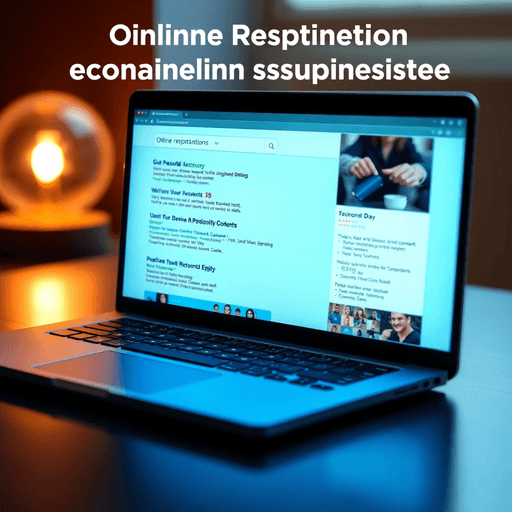Reputation management SEO is crucial for maintaining and improving your online presence. As the digital world changes, the importance of SEO for online reputation continues to grow. Google plays a key role in shaping how you are seen online, with search results often being the first interaction between businesses and potential customers.
It’s essential for businesses to care about how they appear on search engines because first impressions matter. Users tend to trust what they see at the top of search results, making it vital to manage your brand’s image effectively. This includes using strategies to remove negative business listings from Google or even delete your business from Google Maps, if needed.
Integrating search engine reputation management (ORM) into your SEO strategy is now a strategic necessity rather than an option. This approach helps brands succeed in a competitive market by ensuring that positive content is visible and negative content is hidden, ultimately building trust and credibility among users. For individuals looking to master their personal brand, exploring individual online reputation management strategies can provide valuable insights.
Additionally, resources like the Fix My Reputation Online blog offer a wealth of information on protecting your digital image and managing online reviews effectively.
Understanding Reputation Management SEO
Reputation management SEO goes beyond traditional search engine optimization by focusing on shaping and controlling your brand’s image on search engine results pages (SERPs). Unlike conventional SEO, which primarily aims at improving organic rankings through keyword targeting, link building, and content optimization, reputation management SEO integrates these strategies with online reputation management (ORM) techniques to protect and enhance a brand’s online presence.
Key ORM Techniques
- Suppressing Negative Content: Using SEO tactics to push down harmful or negative content in the SERPs. This can involve creating high-quality content that is more relevant and authoritative, which results in pushing the negative content lower in search results.
- Amplifying Positive Visibility: Leveraging positive content from websites, social media platforms, videos, and news coverage to dominate the first page of search results. This not only improves perception but also increases trust among potential customers.
Importance of Shaping Brand Perception on SERPs
Users often trust what appears first on SERPs. Therefore, influencing the top search results is crucial for maintaining a favorable brand image. When potential customers see positive information about your brand at the top of search results, they are more likely to trust and engage with your business. Effective reputation management SEO ensures that your brand puts its best foot forward in the digital landscape.
To achieve this, it’s essential to incorporate effective crisis management techniques, which can protect your brand during tough times. Moreover, mastering corporate reputation management can unlock top talent and customer loyalty with strong reputation strategies.
Creating a positive brand image through storytelling strategies can build emotional connections and strengthen brand identity. Additionally, implementing strategic corporate communication can enhance brand reputation and drive business success.
Finally, mastering the art of business reputation management is crucial for building, protecting, and restoring your online reputation for a strong brand presence.
The Impact of Online Reputation on SEO Performance
A strong online reputation significantly influences search rankings and user behavior, leading to higher click-through rates (CTR) and improved conversions. When users encounter positive content about a brand on search engine results pages (SERPs), they are more likely to click through to the website. This increased engagement signals to search engines that the site is trustworthy and relevant, which can enhance its position in search rankings.
How Online Reputation Affects SEO
- Positive reviews and testimonials: These act as social proof, reassuring potential customers about their choices. Comparing 5-star reviews can reveal factors behind high-rated reviews that optimize your online reputation for conversions.
- Authoritative content: Publishing well-researched articles or securing mentions from reputable sites strengthens your brand’s perceived expertise.
The Role of Consumer Trust in SEO
Consumer trust plays a crucial role in driving organic traffic. When potential customers see favorable reviews, testimonials, or authoritative content about a brand, it builds confidence and encourages them to engage with the site. Trustworthy brands are more likely to be cited as credible sources, establishing authority in search results.
Challenges in Maintaining a Positive Online Reputation
However, maintaining a positive online reputation can be challenging. In such instances, employing fast reputation repair strategies is essential for revamping your online presence swiftly. Such strategies ensure damage control and fortify your online presence for future resilience.
Moreover, businesses should also be prepared for any potential backlash that could harm their reputation. Mastering reputation crisis management is crucial for success in the digital landscape. A strong digital reputation not only attracts talent but also boosts market value and enhances customer perception.
By focusing on building and maintaining a positive online reputation, businesses can attract more organic traffic, achieve higher CTRs, and boost conversions. This approach not only enhances brand perception but also solidifies the brand’s authority in the competitive digital landscape.
Key Components of an Effective Reputation Management SEO Strategy
1. Suppressing Negative Content and Amplifying Positive Visibility
Businesses can leverage reputation management SEO to manage their online presence effectively. Suppressing negative content is crucial as it helps reduce the visibility of harmful information in search engine results pages (SERPs). Several SEO tactics can be employed to achieve this:
Keyword-Rich Optimization
By optimizing existing content with relevant keywords, businesses can push down negative content. Creating new, high-quality content that targets specific keywords related to your business can help improve your search engine rankings.
Social Media Profiles
Active social media profiles often rank highly on SERPs. Regularly updating these profiles with positive content about your brand can help suppress negative articles or mentions.
Website and Blog Posts
Regularly publishing keyword-rich blog posts and updates on your website can contribute to pushing harmful content further down the search results. Ensure that these posts are informative, engaging, and provide value to your audience.
Videos and Multimedia Content
Creating engaging videos and multimedia content that highlights positive aspects of your business can also help in amplifying positive visibility. Platforms like YouTube are highly authoritative and frequently appear at the top of SERPs.
Amplifying positive visibility involves strategic efforts to enhance how your brand is perceived online:
- News Articles and Press Releases: Securing coverage in reputable news outlets through press releases or media outreach can significantly boost your online reputation. These pieces often rank well on search engines and can help establish authority.
- Guest Blogging and Influencer Collaborations: Collaborating with industry influencers or guest blogging on high-authority sites can generate quality backlinks and positive mentions, further enhancing your reputation.
- Customer Testimonials and Reviews: Encouraging satisfied customers to leave positive reviews on platforms like Google My Business, Yelp, and industry-specific review sites can amplify your positive presence online.
By systematically suppressing negative content while simultaneously amplifying positive visibility, businesses can improve their online reputation management efforts. This balanced approach not only helps in maintaining a favorable brand image but also ensures sustained credibility in the eyes of potential customers. If harmful posts are affecting your reputation, consider utilizing professional services for content removal or removing harmful online posts which can safeguard your online presence effectively.
2. Managing Reviews and Building Trust
Monitoring reviews across platforms is crucial for maintaining a good reputation and improving search visibility. Effective review management can significantly impact your brand’s credibility and trustworthiness, which directly influences your online reputation.
Key strategies for managing reviews:
- Consistent Monitoring: Regularly check reviews on Google, Yelp, social media profiles, and other relevant platforms. Use tools like Google Alerts or specialized review management software to stay updated.
- Prompt Responses: Engage with both positive and negative feedback promptly. Acknowledging positive reviews can reinforce customer loyalty. Addressing negative reviews with a sincere apology or solution demonstrates your commitment to customer satisfaction.
- Keyword-Rich Responses: Incorporate relevant keywords in your responses to improve SEO. For instance, if you’re responding to a review about a specific product or service, mention it by name in your reply.
Building Trust through Reviews:
- Transparency: Be honest and transparent in your communications. If there’s an issue, admit fault where necessary and outline the steps being taken to rectify it.
- Encourage Positive Feedback: Politely ask satisfied customers to leave positive reviews. This helps amplify positive content and suppress negative content naturally.
- Highlight Positive Reviews: Showcase positive testimonials on your website and social media profiles. This not only boosts credibility but also enhances keyword-rich optimization for better search rankings. For instance, showcasing stellar reviews can help build trust and drive more business success online.
By actively managing reviews and building trust, you not only enhance your brand’s image but also leverage reputation management SEO to improve overall search engine visibility. Implementing strategies from DIY online reputation management tips can further assist in managing online reviews effectively and handling negative feedback with ease. Moreover, following some online reputation tips can help boost brand credibility with positive reviews, engaging content & social media presence which ultimately drives conversions up to 34%.
3. Optimizing Owned Digital Assets for Maximum Impact
Your owned digital assets—websites, blogs, Google Business Profile, and social media profiles—are the backbone of effective reputation management SEO. Each element should be optimized with intention to suppress negative content and amplify positive content across search results.
Essentials for Optimization:
- Meta Descriptions: Craft keyword-rich meta descriptions for every page. These concise summaries appear in search results and influence click-through rates while reinforcing your brand’s most positive attributes.
- Alt Tags: Use descriptive alt tags on all images, incorporating relevant keywords tied to your brand and reputation management goals. Proper image optimization increases accessibility and supports higher rankings in image search.
- Content Audit: Routinely review existing website content. Remove or rewrite outdated information that could fuel negative perceptions, ensuring all pages align with current branding and messaging strategies.
- Google Business Profile: Keep this profile updated with accurate contact details, business hours, and a compelling description. Upload high-quality images and encourage satisfied customers to leave reviews directly on your profile, making it a hub for positive content amplification.
- Social Media Profiles & News Articles: Optimize all public-facing profiles with consistent branding and up-to-date information. Share recent news articles or press releases featuring your business to push down negative mentions in SERPs.
Focusing on these technical aspects ensures your digital assets consistently project trustworthiness, authority, and relevance—key components in any successful reputation management SEO strategy. This approach strengthens the foundation before leveraging PR campaigns or broader outreach efforts.
4. Using PR Campaigns And Media Outreach For Backlink Building And Authority Establishment
Public relations campaigns and media outreach are essential for managing your online reputation through SEO. They provide direct ways to reduce the impact of negative content and promote positive content. When reputable news articles or industry publications feature your brand, it not only improves how people see your brand but also creates valuable backlinks that search engines highly appreciate.
1. High-Authority Backlinks
Getting mentioned in major news outlets or respected blogs sends strong trust signals to Google. These authoritative backlinks help push down negative search results, increasing the visibility of positive content.
2. Strategic Storytelling
Well-crafted PR campaigns give brands control over their narratives. Sharing success stories, community involvement, or new partnerships across credible platforms shifts focus away from past mistakes and outdated information.
3. Keyword-Rich Optimization
Optimizing press releases and media placements with targeted keywords ensures your brand appears in relevant searches. This is crucial for both reducing the impact of negative content and promoting positive content.
4. Diverse Asset Promotion
Media outreach involves more than just articles. Podcasts, interviews, and guest columns on industry sites all contribute to a strong link profile and improved authority.
5. Synergy With Social Media Profiles
Sharing earned media coverage on social platforms expands reach and creates additional signals that reinforce credibility in search engine results pages (SERPs).
A well-coordinated PR strategy not only manages reviews and builds trust but also supports ongoing efforts in review management, keyword-rich optimization, and continuously improving your brand’s online presence. This approach helps protect your reputation while enhancing organic search performance through a steady stream of high-quality backlinks.
To effectively implement these strategies, consider exploring various public relations strategies that can significantly enhance your brand image and credibility.
Monitoring Brand Mentions And Acting Swiftly Against Negative Content To Protect Your Online Reputation
Brand monitoring tools are essential for protecting your online reputation. Platforms like Google Alerts, Mention, and Brand24 allow you to track real-time mentions of your brand across search engines, blogs, forums, and social media channels. Early detection is critical—when negative content surfaces, a prompt response often makes the difference between a contained issue and a viral crisis.
Effective Monitoring Techniques
Effective monitoring means identifying harmful reviews, outdated information, or damaging news quickly. In some cases, it may even be necessary to consider a Google Business Profile removal to protect brand consistency and online presence. Responding swiftly—whether through public engagement or private resolution—mitigates risk and demonstrates transparency. Many leading firms integrate these technologies into daily operations, ensuring reputational threats are neutralized before they gain traction.
The Role of Brand Image in Marketing
Moreover, understanding the importance of brand image in marketing can also play a significant role in maintaining a positive online presence. A strong brand image not only boosts reputation but also attracts top talent and drives customer loyalty.
Seeking Professional Help
In instances where negative content has already affected your brand’s image, engaging professional reputation repair services can provide effective strategies to manage and repair your online reputation.
Local SEO’s Role In Enhancing Reputation Management For Businesses
For local businesses, reputation management SEO plays a crucial role in attracting customers from specific geographic areas. When people search for products or services near them, they heavily rely on local search results and reviews to make decisions. A single negative review or inconsistent business information can drive potential customers straight to competitors.
Key elements of effective local SEO strategies include:
- Consistent NAP Listings: Your business name, address, and phone number (NAP) must be identical across all local directories, Google Business Profile, and social platforms. Discrepancies confuse both users and search engines, potentially harming trust and rankings.
- Targeting Local Keywords: Incorporate city-specific phrases and terms that match the way locals search for businesses like yours. This increases visibility for people who are ready to buy in your area.
- Review Monitoring and Management: Promptly address feedback on Google, Yelp, Facebook, and other local platforms. Positive interactions build trust with nearby customers while showing Google your business is active and reputable.
Local reputation doesn’t just impact online perception—it directly shapes foot traffic, phone calls, and new customer inquiries.
A proactive approach to reputation management at the local level ensures your business stands out as a trusted option within your community. Mastering the value proposition’s essence can significantly bolster your reputation management efforts, setting your brand apart and attracting loyal customers effortlessly.
Case Study Insights From Fix My Reputation Online (FMRO)
Fix My Reputation Online testimonials highlight the impact of tailored reputation management strategies for both individuals and businesses.
Restoring Brand Image for a Small Business Owner
Jeffery Haze, a small business owner, faced a damaging online campaign that threatened his company’s credibility. FMRO implemented a comprehensive plan, combining classic ORM techniques—such as targeted SEO and positive content amplification—with innovative approaches like rapid suppression of negative articles. This combination restored Jeffery’s brand image and improved his search visibility.
Replacing Harmful Content for an Individual Client
J.F.T., another client, struggled with outdated personal information appearing prominently in Google results. FMRO responded by deploying advanced keyword targeting, structured website optimization, and continuous monitoring of online mentions. As a result, positive assets replaced harmful content on search engine results pages.
Small business reputation management requires this level of adaptability and confidentiality. FMRO’s approach addresses each client’s unique challenges while protecting their public persona and ensuring long-term positive visibility.
Why Integrating Reputation Management Into Your SEO Strategy Is Essential
An integrated ORM and SEO strategy empowers brands to shape their own story in the digital space. When search results display consistent, positive messaging across multiple platforms, your business gains authority and trust. By combining the technical strengths of SEO—such as keyword targeting and on-page optimization—with proactive reputation management, brands can:
- Control their brand narrative: Strategic content placement and suppression of negative mentions ensure users encounter your preferred message first.
- Enhance long-term visibility: Positive media coverage, reviews, and owned content surface higher in search results, crowding out outdated or damaging material.
- Build consumer trust: Users are more likely to engage with businesses that present a strong, credible presence across all touchpoints.
- Drive sustainable growth: Higher click-through rates, increased conversions, and improved customer loyalty stem from a managed online reputation.
A unified approach means every piece of content—whether it’s a blog post, review response, or press release—works together to strengthen your brand’s position in search engines while protecting its reputation. This synergy gives you real control over how audiences perceive your business online.
Conclusion
In today’s digital world, it’s crucial to have a proactive mindset when it comes to protecting your online brand. By combining the benefits of reputation management SEO with advanced optimization practices, you can create a strong defense against negative content and increase positive visibility.
Here are three key strategies to implement:
- Control your narrative using both traditional ORM tools and modern SEO tactics.
- Protect your brand by consistently monitoring and optimizing all digital touchpoints.
- Drive sustainable growth through a unified approach that enhances trust, authority, and search rankings.
Investing in integrated reputation management SEO is essential for ensuring the success of your business, regardless of how competitive the industry becomes.






